人教版(2019)选择性必修第一册Unit 4 Body LanguageLanguage points 1 课件(共23张PPT)
文档属性
| 名称 | 人教版(2019)选择性必修第一册Unit 4 Body LanguageLanguage points 1 课件(共23张PPT) |
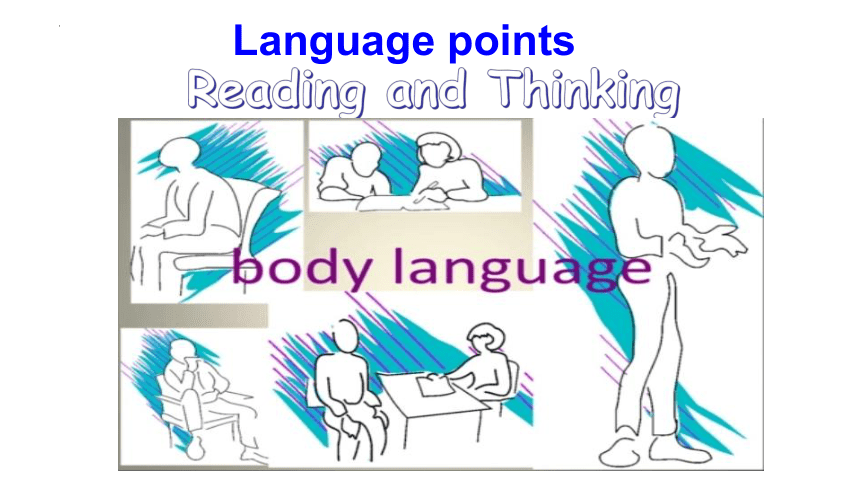
|
|
| 格式 | pptx | ||
| 文件大小 | 679.1KB | ||
| 资源类型 | 教案 | ||
| 版本资源 | 人教版(2019) | ||
| 科目 | 英语 | ||
| 更新时间 | 2024-04-14 19:33:11 | ||
图片预览

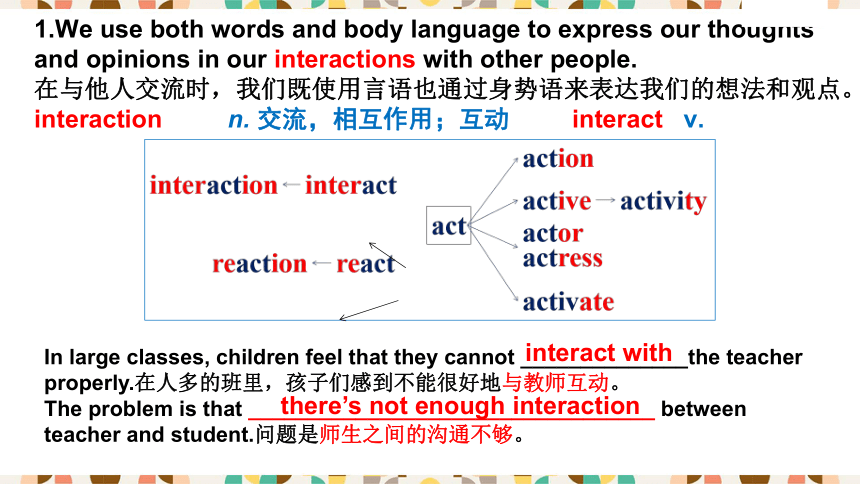
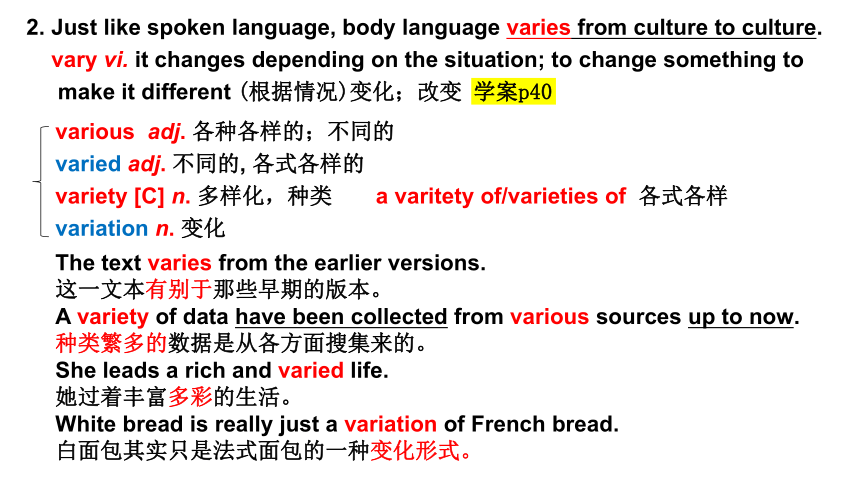
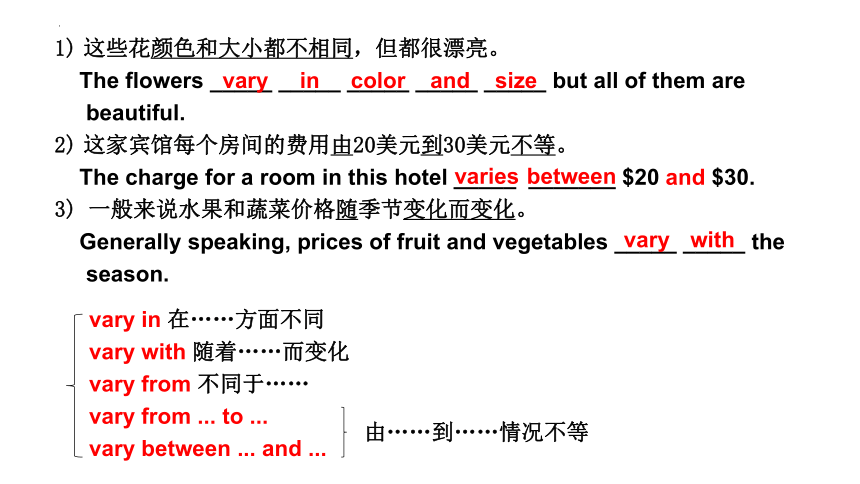
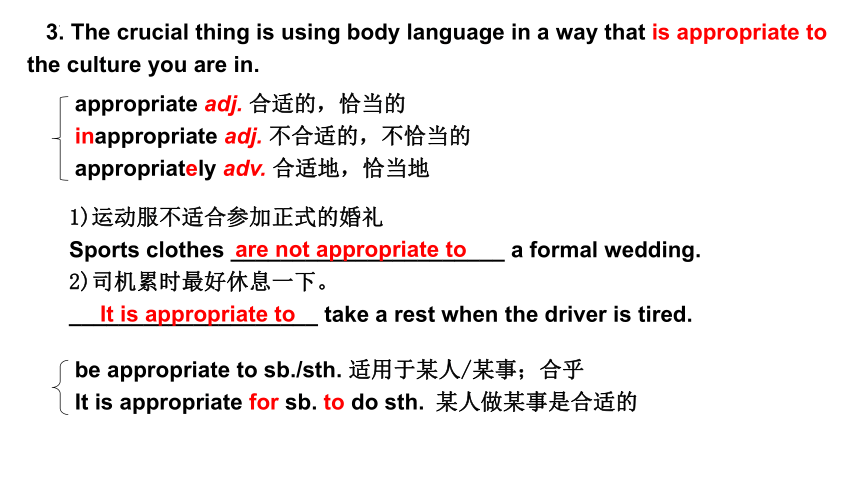
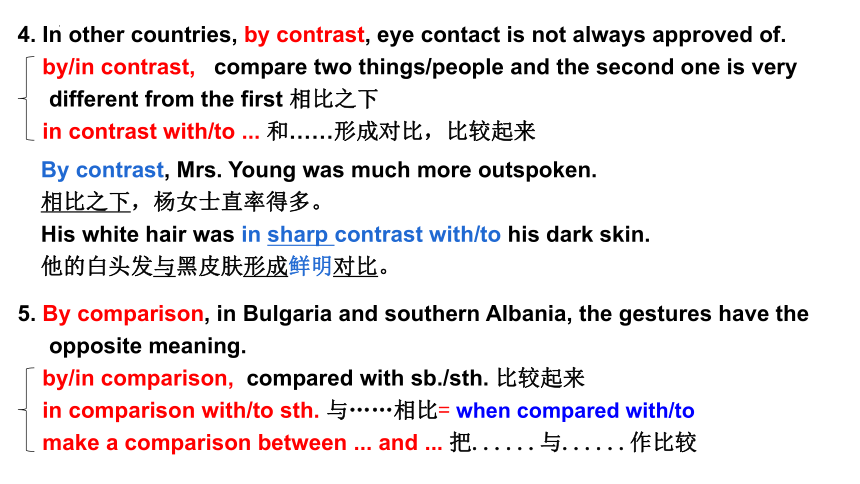
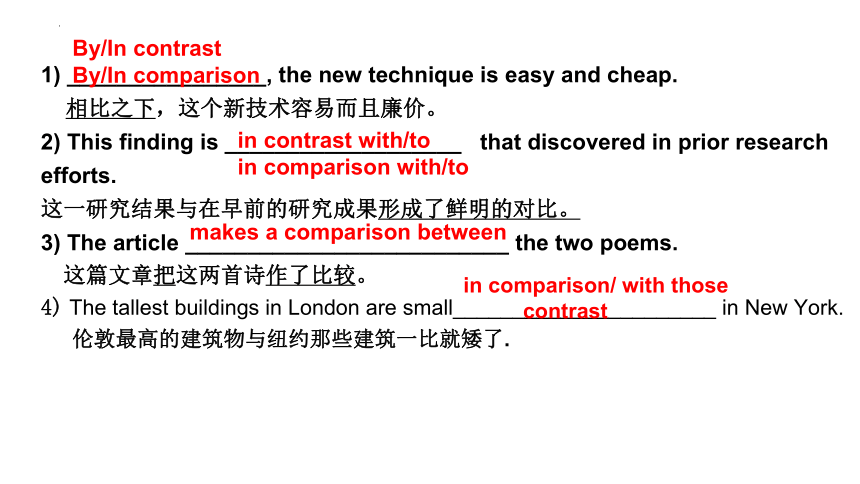
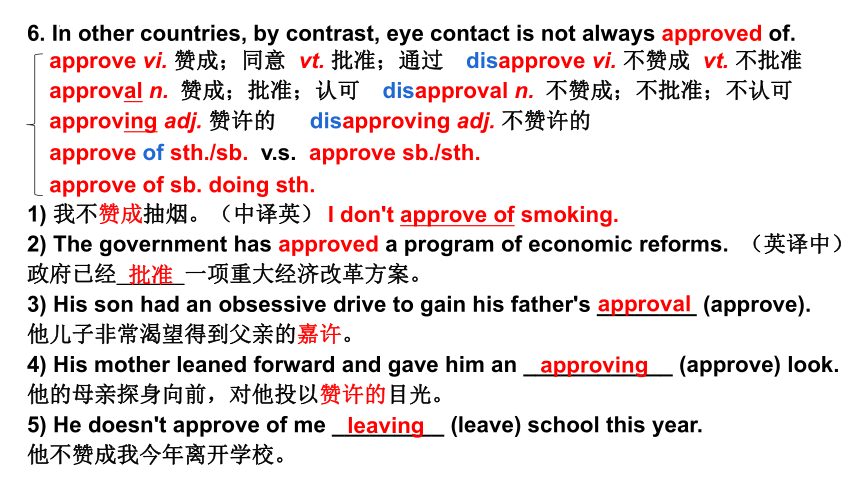
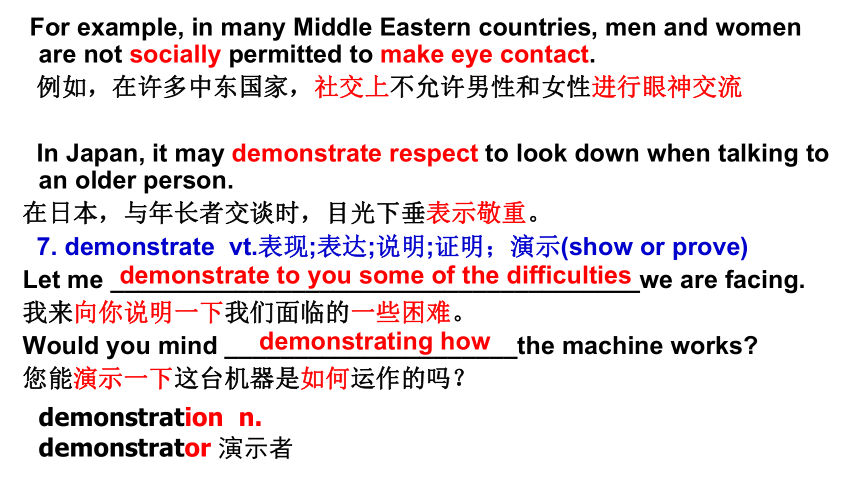
文档简介
(共23张PPT)
Reading and Thinking
Language points
1.We use both words and body language to express our thoughts and opinions in our interactions with other people.
在与他人交流时,我们既使用言语也通过身势语来表达我们的想法和观点。
interaction n. 交流,相互作用;互动 interact v.
In large classes, children feel that they cannot ______________the teacher properly.在人多的班里,孩子们感到不能很好地与教师互动。
The problem is that __________________________________ between teacher and student.问题是师生之间的沟通不够。
interact with
there’s not enough interaction
2. Just like spoken language, body language varies from culture to culture.
vary vi. it changes depending on the situation; to change something to make it different (根据情况)变化;改变 学案p40
various adj. 各种各样的;不同的
varied adj. 不同的, 各式各样的
variety [C] n. 多样化,种类 a varitety of/varieties of 各式各样
variation n. 变化
The text varies from the earlier versions.
这一文本有别于那些早期的版本。
A variety of data have been collected from various sources up to now.
种类繁多的数据是从各方面搜集来的。
She leads a rich and varied life.
她过着丰富多彩的生活。
White bread is really just a variation of French bread.
白面包其实只是法式面包的一种变化形式。
vary in 在……方面不同
vary with 随着……而变化
vary from 不同于……
vary from ... to ...
vary between ... and ...
1) 这些花颜色和大小都不相同,但都很漂亮。
The flowers _____ _____ _____ _____ _____ but all of them are beautiful.
2) 这家宾馆每个房间的费用由20美元到30美元不等。
The charge for a room in this hotel _____ _______ $20 and $30.
3) 一般来说水果和蔬菜价格随季节变化而变化。
Generally speaking, prices of fruit and vegetables _____ _____ the season.
vary in color and size
varies
between
vary
with
由……到……情况不等
3. The crucial thing is using body language in a way that is appropriate to the culture you are in.
appropriate adj. 合适的,恰当的
inappropriate adj. 不合适的,不恰当的
appropriately adv. 合适地,恰当地
be appropriate to sb./sth. 适用于某人/某事;合乎
It is appropriate for sb. to do sth. 某人做某事是合适的
1)运动服不适合参加正式的婚礼
Sports clothes ______________________ a formal wedding.
2)司机累时最好休息一下。
____________________ take a rest when the driver is tired.
It is appropriate to
are not appropriate to
4. In other countries, by contrast, eye contact is not always approved of.
by/in contrast, compare two things/people and the second one is very different from the first 相比之下
in contrast with/to ... 和……形成对比,比较起来
By contrast, Mrs. Young was much more outspoken.
相比之下,杨女士直率得多。
His white hair was in sharp contrast with/to his dark skin.
他的白头发与黑皮肤形成鲜明对比。
5. By comparison, in Bulgaria and southern Albania, the gestures have the opposite meaning.
by/in comparison, compared with sb./sth. 比较起来
in comparison with/to sth. 与……相比= when compared with/to
make a comparison between ... and ... 把......与......作比较
1) ________________, the new technique is easy and cheap.
相比之下,这个新技术容易而且廉价。
2) This finding is ___________________ that discovered in prior research efforts.
这一研究结果与在早前的研究成果形成了鲜明的对比。
3) The article __________________________ the two poems.
这篇文章把这两首诗作了比较。
4) The tallest buildings in London are small______________________ in New York. 伦敦最高的建筑物与纽约那些建筑一比就矮了.
By/In contrast
By/In comparison
in contrast with/to
in comparison with/to
makes a comparison between
in comparison/ with those
contrast
6. In other countries, by contrast, eye contact is not always approved of.
1) 我不赞成抽烟。(中译英)
2) The government has approved a program of economic reforms. (英译中)
政府已经______一项重大经济改革方案。
3) His son had an obsessive drive to gain his father's ________ (approve).
他儿子非常渴望得到父亲的嘉许。
4) His mother leaned forward and gave him an ____________ (approve) look.
他的母亲探身向前,对他投以赞许的目光。
5) He doesn't approve of me _________ (leave) school this year.
他不赞成我今年离开学校。
批准
I don't approve of smoking.
approval
approving
leaving
approve vi. 赞成;同意 vt. 批准;通过 disapprove vi. 不赞成 vt. 不批准
approval n. 赞成;批准;认可 disapproval n. 不赞成;不批准;不认可
approving adj. 赞许的 disapproving adj. 不赞许的
approve of sth./sb. v.s. approve sb./sth.
approve of sb. doing sth.
For example, in many Middle Eastern countries, men and women are not socially permitted to make eye contact.
例如,在许多中东国家,社交上不允许男性和女性进行眼神交流
In Japan, it may demonstrate respect to look down when talking to an older person.
在日本,与年长者交谈时,目光下垂表示敬重。
7. demonstrate vt.表现;表达;说明;证明;演示(show or prove)
Let me ______________________________________we are facing.
我来向你说明一下我们面临的一些困难。
Would you mind _____________________the machine works
您能演示一下这台机器是如何运作的吗?
demonstrate to you some of the difficulties
demonstrating how
demonstration n.
demonstrator 演示者
In Japan, someone who witnesses another person employing the gesture might think it means money.
在日本,如果看到另一个人用这个手势,可能认为这意味着钱。
8. witness vt. 当场看到;目击;见证
n. 目击者;证人= eyewitness
1) 我母亲是发生在马路拐角处的事故的目击者。
2) 有人目睹了这起交通事故吗?
3)这所大学多年来发生了不少变化。
My mother was ______________the accident at the street corner.
Did anyone___________________________
This university ____________________________________over the years.
a witness of/to
witness the traffic accident
has witnessed/seen quite a few changes
8. In Japan, someone who witnesses another person employing the gesture might think it means money.
employ vt. 使用,应用;雇佣 employ a method/technique
employee n. 受雇者,雇工,雇员
employer n. 雇用者,雇主
employment n. 雇用,就业 unemployment n. 失业
1) Arts agencies employ more than 10,000 people as part-time employees. __________
2) She agrees and hopes her team’ s findings might one day help employ the enzyme(酶)to break down plastics in landfills. __________
3) More than 750,000 have graduated, with many seeking employment in engineering, medicine. __________
雇佣
使用
寻求就业
employ sb. as ... 雇用某人作为……
employ sb. to do sth. 雇用某人做某事
be employed in (doing) sth.
=employ oneself in 忙于(做)某事
Kelly is employed as a mechanic.
凯利受雇当了一名技工。
We have been employed to look at ways of reducing waste.
我们受雇研究减少浪费的方法。
Her days are employed in gardening and voluntary work.
=She employs herself in gardening and voluntary work.
她的时间都花在搞园艺和做义工上。
In France, a person encountering an identical gesture may interpret it as meaning zero. 在法国,看到同一个手势的人可能会将其解读为“零”。
9. identical adj. the same 同一的
be identical to/with …= exactly alike 完全相同的; 一模一样的
This picture ___________________the one my mother has.
这张照片和我母亲的那张一模一样.
is identical to/with
10. interpret
1)vt. 解释; 说明 interpret sth as sth 把…理解/解释为…
I ________________________________.
我把他的沉默理解为拒绝。
2)vt.&vi. 作口译
She couldn't speak much English so her children had to __________________.
她讲不了几句英语,所以她的孩子们得给她翻译。
interpreter n. 口译者; misinterpret v.错误理解,错误解释
interpretation n. 解释、理解、口译
interpreted his silence as a refusal
interpret for her.
11. Even the gestures we use for “yes” and “no” differ around the world.
differ vi. 相异;不同于;有异议,有分歧
different adj. 不同的,有区别的
difference n. 差异,不同
differ from 与......不同;区别于......
differ in 不同于,在......方面不同
differ with sb. (on sth.) 与......意见不一
be different from 与......不同
make a/no difference to 有/无影响
Mary _____________________ many ways. 玛丽在许多方面与我不同。
Jack _____________________ education. 杰克和他的父亲对教育问题持不同看法。
Your support will ______________________ me. 你的支持对我有影响。
make a difference to
differs from me in
differed with his father on
12. Elsewhere, people favor shaking hands, bowing from the waist, or nodding the head when they meet someone else.
favor
1) n. 帮助;恩惠;赞同
He has won favour with a wide range of interest groups.
他已经获得众多利益集团的支持。
I've come to ask you to do me a favour.
我来这儿是想请你帮个忙。
2) vt. 较喜欢;选择;有利于
The French say they favour a transition to democracy.
法国人说他们倾向于向民主过渡。
ask a favor of sb. = ask sb. a favor 求某人帮忙
do sb. a favor 帮某人忙 in favor of 赞同,支持 in sb.’s favor 有助于某人
favorite n. 特别喜爱的东西;宠儿 adj. 最喜欢的
favorable adj. 赞成的;有利的
【语境应用】完成句子。
1) Could you _____________ (帮我一个忙) and turn off the light
2) In their discussion, I was ____________ (支持) Mr. Li.
3) The current economy ____________ the development of small businesses. 当前经济对小企业的发展不利。
4) The exchange rate is ________________at the moment.
目前汇率对我们有利。
5) Fortune______________________. 天佑勇者。
6) The government _________________the present policies.
政府倾向于将目前的政策延续下去。
do me a favor
in favor of
does not favor
in our favor
favors the brave
favors continuing
13. bow vi. 鞠躬;点头;屈从于 vt.低(头) n.[c]弓;蝴蝶结
bow one’s head 低头
bow to sb./sth 向…鞠躬,向…屈服, 勉强同意做…
take/give a bow 鞠躬
Phil stood, (with) his head ________________in shame.
菲尔站在那儿,羞愧地低下了头。
bowed/lowered
Placing your hands together and resting them on the side of your head while closing your eyes means “sleep”. A good way of saying “I am full” is moving your hand in circles over your stomach after a meal.
双手并拢放在头的一侧,同时闭上眼睛表示“睡觉”。用餐后轻轻用手在胃部转圈表示“我饱了”。
14. rest on/against sth:使…倚在;把…靠在
She rested her elbows on the table.
她把肘部靠在桌子上.
Rest the ladder against the wall.
把梯子靠在墙上.
15. A smile can break down barriers.
The police broke the door down in order to save the girl in the room. __________
Each lesson is broken down into several parts. _________
My car broke down on my way home. ______________
We can’t have you breaking down in health. ______________
She broke down in tears. ________________
打破
(机器等)坏了
分解
(身体)垮了
1) The thieves _________________ and stole some money.
小偷闯入办公室,偷了一些钱。
2) Scientists think they are beginning to _____________ in the fight against cancer.
科学家认为他们在对抗癌症的研究中开始有所突破。
3) I was still living in London when the war ____________.
战争爆发的时候我还住在伦敦。
broke into the office
break through
broke out
(精神、情绪)奔溃
4) _______________ the chocolate and melt it.
把巧克力弄碎,使其融化。
5) We have decided to _____________ the diplomatic relations with that country.
我们决定中断与那个国家的外交关系。
Break up
break off
break into 强行进入;打断
break off 中断
break out 突发,爆发
break through 突破,突围
break up 打碎,分裂
16. And if we are feeling down or lonely, there is nothing better than seeing the smiling face of a good friend. 如果我们感到沮丧或孤独,没有什么比看到一个好朋友的笑脸更好了。
本句包含if引导的条件状语从句;there be句型;
nothing better than:否定词+比较级+than,表示最高级。
否定词一般有:not, no, never, nothing等。
最高级句式还有:can’t/couldn’t + 比较级
This could give her no greater pleasure.
这使她再高兴不过了。
I couldn’t have enjoyed it more, though I felt a little bit cold.
虽然我觉得有点冷,但我玩的不能再开心了。
I think nothing is more pleasant than traveling.
我觉得没有比旅行更快乐的事情了。
Smiles can be used to hide feelings like anger, fear, or worry.
17. anger
n.[u]生气
be shaking with (=in) anger 气地发抖
vt./vi to make someone angry (使) 生气,激怒
It always __________________________to see so much waste.
看到如此严重的浪费,我总是感到很气愤。
angers me / makes me angry
Which is a more reliable guide for understanding someone's feelings, their body language or the words they speak
18. reliable adj. 可靠的;可信赖的; 真实可信的 OPP unreliable
reliably adv. reliability n.[u]可靠性
rely on (=upon) sb. to do / doing 指望/相信某人做某事
我们在物色可靠而又勤奋的人。
We are looking for someone ________________________.
她非常依赖姐姐开车送她上学。
She ________________________ her sister ____________________ to school.
relies heavily / strongly on
to drive /driving her
who is reliable and diligent
Reading and Thinking
Language points
1.We use both words and body language to express our thoughts and opinions in our interactions with other people.
在与他人交流时,我们既使用言语也通过身势语来表达我们的想法和观点。
interaction n. 交流,相互作用;互动 interact v.
In large classes, children feel that they cannot ______________the teacher properly.在人多的班里,孩子们感到不能很好地与教师互动。
The problem is that __________________________________ between teacher and student.问题是师生之间的沟通不够。
interact with
there’s not enough interaction
2. Just like spoken language, body language varies from culture to culture.
vary vi. it changes depending on the situation; to change something to make it different (根据情况)变化;改变 学案p40
various adj. 各种各样的;不同的
varied adj. 不同的, 各式各样的
variety [C] n. 多样化,种类 a varitety of/varieties of 各式各样
variation n. 变化
The text varies from the earlier versions.
这一文本有别于那些早期的版本。
A variety of data have been collected from various sources up to now.
种类繁多的数据是从各方面搜集来的。
She leads a rich and varied life.
她过着丰富多彩的生活。
White bread is really just a variation of French bread.
白面包其实只是法式面包的一种变化形式。
vary in 在……方面不同
vary with 随着……而变化
vary from 不同于……
vary from ... to ...
vary between ... and ...
1) 这些花颜色和大小都不相同,但都很漂亮。
The flowers _____ _____ _____ _____ _____ but all of them are beautiful.
2) 这家宾馆每个房间的费用由20美元到30美元不等。
The charge for a room in this hotel _____ _______ $20 and $30.
3) 一般来说水果和蔬菜价格随季节变化而变化。
Generally speaking, prices of fruit and vegetables _____ _____ the season.
vary in color and size
varies
between
vary
with
由……到……情况不等
3. The crucial thing is using body language in a way that is appropriate to the culture you are in.
appropriate adj. 合适的,恰当的
inappropriate adj. 不合适的,不恰当的
appropriately adv. 合适地,恰当地
be appropriate to sb./sth. 适用于某人/某事;合乎
It is appropriate for sb. to do sth. 某人做某事是合适的
1)运动服不适合参加正式的婚礼
Sports clothes ______________________ a formal wedding.
2)司机累时最好休息一下。
____________________ take a rest when the driver is tired.
It is appropriate to
are not appropriate to
4. In other countries, by contrast, eye contact is not always approved of.
by/in contrast, compare two things/people and the second one is very different from the first 相比之下
in contrast with/to ... 和……形成对比,比较起来
By contrast, Mrs. Young was much more outspoken.
相比之下,杨女士直率得多。
His white hair was in sharp contrast with/to his dark skin.
他的白头发与黑皮肤形成鲜明对比。
5. By comparison, in Bulgaria and southern Albania, the gestures have the opposite meaning.
by/in comparison, compared with sb./sth. 比较起来
in comparison with/to sth. 与……相比= when compared with/to
make a comparison between ... and ... 把......与......作比较
1) ________________, the new technique is easy and cheap.
相比之下,这个新技术容易而且廉价。
2) This finding is ___________________ that discovered in prior research efforts.
这一研究结果与在早前的研究成果形成了鲜明的对比。
3) The article __________________________ the two poems.
这篇文章把这两首诗作了比较。
4) The tallest buildings in London are small______________________ in New York. 伦敦最高的建筑物与纽约那些建筑一比就矮了.
By/In contrast
By/In comparison
in contrast with/to
in comparison with/to
makes a comparison between
in comparison/ with those
contrast
6. In other countries, by contrast, eye contact is not always approved of.
1) 我不赞成抽烟。(中译英)
2) The government has approved a program of economic reforms. (英译中)
政府已经______一项重大经济改革方案。
3) His son had an obsessive drive to gain his father's ________ (approve).
他儿子非常渴望得到父亲的嘉许。
4) His mother leaned forward and gave him an ____________ (approve) look.
他的母亲探身向前,对他投以赞许的目光。
5) He doesn't approve of me _________ (leave) school this year.
他不赞成我今年离开学校。
批准
I don't approve of smoking.
approval
approving
leaving
approve vi. 赞成;同意 vt. 批准;通过 disapprove vi. 不赞成 vt. 不批准
approval n. 赞成;批准;认可 disapproval n. 不赞成;不批准;不认可
approving adj. 赞许的 disapproving adj. 不赞许的
approve of sth./sb. v.s. approve sb./sth.
approve of sb. doing sth.
For example, in many Middle Eastern countries, men and women are not socially permitted to make eye contact.
例如,在许多中东国家,社交上不允许男性和女性进行眼神交流
In Japan, it may demonstrate respect to look down when talking to an older person.
在日本,与年长者交谈时,目光下垂表示敬重。
7. demonstrate vt.表现;表达;说明;证明;演示(show or prove)
Let me ______________________________________we are facing.
我来向你说明一下我们面临的一些困难。
Would you mind _____________________the machine works
您能演示一下这台机器是如何运作的吗?
demonstrate to you some of the difficulties
demonstrating how
demonstration n.
demonstrator 演示者
In Japan, someone who witnesses another person employing the gesture might think it means money.
在日本,如果看到另一个人用这个手势,可能认为这意味着钱。
8. witness vt. 当场看到;目击;见证
n. 目击者;证人= eyewitness
1) 我母亲是发生在马路拐角处的事故的目击者。
2) 有人目睹了这起交通事故吗?
3)这所大学多年来发生了不少变化。
My mother was ______________the accident at the street corner.
Did anyone___________________________
This university ____________________________________over the years.
a witness of/to
witness the traffic accident
has witnessed/seen quite a few changes
8. In Japan, someone who witnesses another person employing the gesture might think it means money.
employ vt. 使用,应用;雇佣 employ a method/technique
employee n. 受雇者,雇工,雇员
employer n. 雇用者,雇主
employment n. 雇用,就业 unemployment n. 失业
1) Arts agencies employ more than 10,000 people as part-time employees. __________
2) She agrees and hopes her team’ s findings might one day help employ the enzyme(酶)to break down plastics in landfills. __________
3) More than 750,000 have graduated, with many seeking employment in engineering, medicine. __________
雇佣
使用
寻求就业
employ sb. as ... 雇用某人作为……
employ sb. to do sth. 雇用某人做某事
be employed in (doing) sth.
=employ oneself in 忙于(做)某事
Kelly is employed as a mechanic.
凯利受雇当了一名技工。
We have been employed to look at ways of reducing waste.
我们受雇研究减少浪费的方法。
Her days are employed in gardening and voluntary work.
=She employs herself in gardening and voluntary work.
她的时间都花在搞园艺和做义工上。
In France, a person encountering an identical gesture may interpret it as meaning zero. 在法国,看到同一个手势的人可能会将其解读为“零”。
9. identical adj. the same 同一的
be identical to/with …= exactly alike 完全相同的; 一模一样的
This picture ___________________the one my mother has.
这张照片和我母亲的那张一模一样.
is identical to/with
10. interpret
1)vt. 解释; 说明 interpret sth as sth 把…理解/解释为…
I ________________________________.
我把他的沉默理解为拒绝。
2)vt.&vi. 作口译
She couldn't speak much English so her children had to __________________.
她讲不了几句英语,所以她的孩子们得给她翻译。
interpreter n. 口译者; misinterpret v.错误理解,错误解释
interpretation n. 解释、理解、口译
interpreted his silence as a refusal
interpret for her.
11. Even the gestures we use for “yes” and “no” differ around the world.
differ vi. 相异;不同于;有异议,有分歧
different adj. 不同的,有区别的
difference n. 差异,不同
differ from 与......不同;区别于......
differ in 不同于,在......方面不同
differ with sb. (on sth.) 与......意见不一
be different from 与......不同
make a/no difference to 有/无影响
Mary _____________________ many ways. 玛丽在许多方面与我不同。
Jack _____________________ education. 杰克和他的父亲对教育问题持不同看法。
Your support will ______________________ me. 你的支持对我有影响。
make a difference to
differs from me in
differed with his father on
12. Elsewhere, people favor shaking hands, bowing from the waist, or nodding the head when they meet someone else.
favor
1) n. 帮助;恩惠;赞同
He has won favour with a wide range of interest groups.
他已经获得众多利益集团的支持。
I've come to ask you to do me a favour.
我来这儿是想请你帮个忙。
2) vt. 较喜欢;选择;有利于
The French say they favour a transition to democracy.
法国人说他们倾向于向民主过渡。
ask a favor of sb. = ask sb. a favor 求某人帮忙
do sb. a favor 帮某人忙 in favor of 赞同,支持 in sb.’s favor 有助于某人
favorite n. 特别喜爱的东西;宠儿 adj. 最喜欢的
favorable adj. 赞成的;有利的
【语境应用】完成句子。
1) Could you _____________ (帮我一个忙) and turn off the light
2) In their discussion, I was ____________ (支持) Mr. Li.
3) The current economy ____________ the development of small businesses. 当前经济对小企业的发展不利。
4) The exchange rate is ________________at the moment.
目前汇率对我们有利。
5) Fortune______________________. 天佑勇者。
6) The government _________________the present policies.
政府倾向于将目前的政策延续下去。
do me a favor
in favor of
does not favor
in our favor
favors the brave
favors continuing
13. bow vi. 鞠躬;点头;屈从于 vt.低(头) n.[c]弓;蝴蝶结
bow one’s head 低头
bow to sb./sth 向…鞠躬,向…屈服, 勉强同意做…
take/give a bow 鞠躬
Phil stood, (with) his head ________________in shame.
菲尔站在那儿,羞愧地低下了头。
bowed/lowered
Placing your hands together and resting them on the side of your head while closing your eyes means “sleep”. A good way of saying “I am full” is moving your hand in circles over your stomach after a meal.
双手并拢放在头的一侧,同时闭上眼睛表示“睡觉”。用餐后轻轻用手在胃部转圈表示“我饱了”。
14. rest on/against sth:使…倚在;把…靠在
She rested her elbows on the table.
她把肘部靠在桌子上.
Rest the ladder against the wall.
把梯子靠在墙上.
15. A smile can break down barriers.
The police broke the door down in order to save the girl in the room. __________
Each lesson is broken down into several parts. _________
My car broke down on my way home. ______________
We can’t have you breaking down in health. ______________
She broke down in tears. ________________
打破
(机器等)坏了
分解
(身体)垮了
1) The thieves _________________ and stole some money.
小偷闯入办公室,偷了一些钱。
2) Scientists think they are beginning to _____________ in the fight against cancer.
科学家认为他们在对抗癌症的研究中开始有所突破。
3) I was still living in London when the war ____________.
战争爆发的时候我还住在伦敦。
broke into the office
break through
broke out
(精神、情绪)奔溃
4) _______________ the chocolate and melt it.
把巧克力弄碎,使其融化。
5) We have decided to _____________ the diplomatic relations with that country.
我们决定中断与那个国家的外交关系。
Break up
break off
break into 强行进入;打断
break off 中断
break out 突发,爆发
break through 突破,突围
break up 打碎,分裂
16. And if we are feeling down or lonely, there is nothing better than seeing the smiling face of a good friend. 如果我们感到沮丧或孤独,没有什么比看到一个好朋友的笑脸更好了。
本句包含if引导的条件状语从句;there be句型;
nothing better than:否定词+比较级+than,表示最高级。
否定词一般有:not, no, never, nothing等。
最高级句式还有:can’t/couldn’t + 比较级
This could give her no greater pleasure.
这使她再高兴不过了。
I couldn’t have enjoyed it more, though I felt a little bit cold.
虽然我觉得有点冷,但我玩的不能再开心了。
I think nothing is more pleasant than traveling.
我觉得没有比旅行更快乐的事情了。
Smiles can be used to hide feelings like anger, fear, or worry.
17. anger
n.[u]生气
be shaking with (=in) anger 气地发抖
vt./vi to make someone angry (使) 生气,激怒
It always __________________________to see so much waste.
看到如此严重的浪费,我总是感到很气愤。
angers me / makes me angry
Which is a more reliable guide for understanding someone's feelings, their body language or the words they speak
18. reliable adj. 可靠的;可信赖的; 真实可信的 OPP unreliable
reliably adv. reliability n.[u]可靠性
rely on (=upon) sb. to do / doing 指望/相信某人做某事
我们在物色可靠而又勤奋的人。
We are looking for someone ________________________.
她非常依赖姐姐开车送她上学。
She ________________________ her sister ____________________ to school.
relies heavily / strongly on
to drive /driving her
who is reliable and diligent
